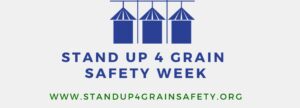Every year hundreds of employees are injured or die from preventable hazards while working in grain storage and handling. Stand Up 4 Grain Safety Week, sponsored by the OSHA Alliance Program, is a coordinated industry effort to raise awareness of grain handling hazards and educate industry members to prevent injuries and incidents associated with grain handling.
Stand Up 4 Grain Safety Week 2021 will feature daily educational events which are virtual and free to attend. Be aware that the events begin at 10am CDT (11am EST).
- Monday, 3/29 – Kick-Off Event

- Tuesday, 3/30 – Near Miss Reporting
- Wednesday, 4/1 – Impact of Quality on Safety
- Thursday, 4/2 – Bin Safety
- Friday, 4/3 – Emergency Action Plans
Assert your commitment to grain safety by registering for these educational events via the Grain Handling Safety Coalition EventBrite page. For additional information and resources on grain safety, visit the Stand Up 4 Safety Week website at https://standup4grainsafety.org.
The OSHA Alliance Program includes the Great Plains Chapter of the Grain Elevator and Processing Society (GEAPS), the National Grain and Feed Association (NGFA), and the Grain Handling Safety Council (GHSC).
 When you’re working in the heat, safety comes first! With the OSHA-NIOSH Heat Safety Tool, you have vital safety information available whenever and wherever you need it – right on your mobile phone – for planning outdoor work activities based on how hot it feels throughout the day. Featuring real-time heat index and hourly forecasts, specific to your location, as well as occupational safety and health recommendations from OSHA and NIOSH.
When you’re working in the heat, safety comes first! With the OSHA-NIOSH Heat Safety Tool, you have vital safety information available whenever and wherever you need it – right on your mobile phone – for planning outdoor work activities based on how hot it feels throughout the day. Featuring real-time heat index and hourly forecasts, specific to your location, as well as occupational safety and health recommendations from OSHA and NIOSH.